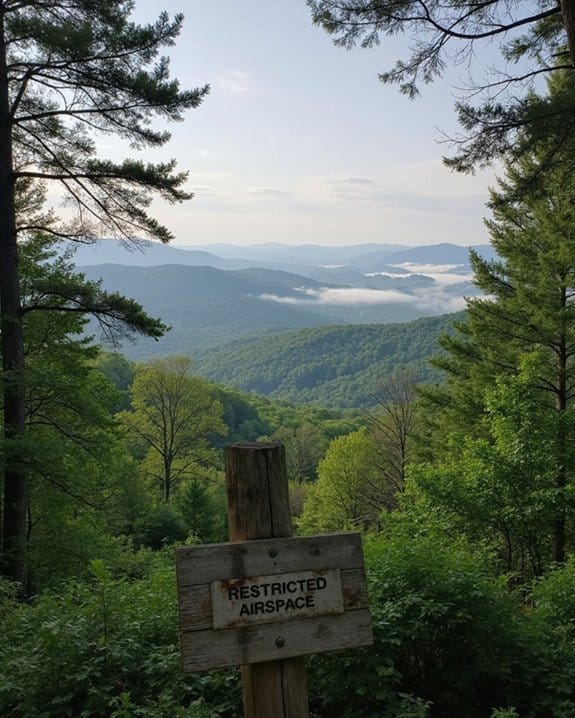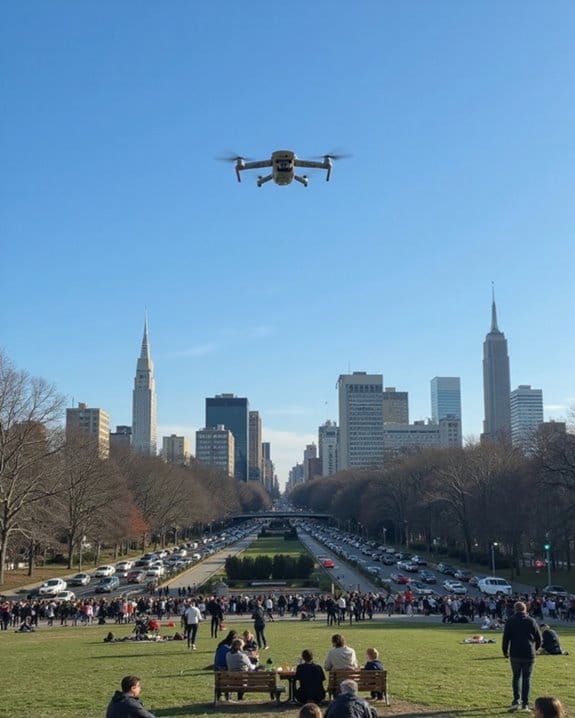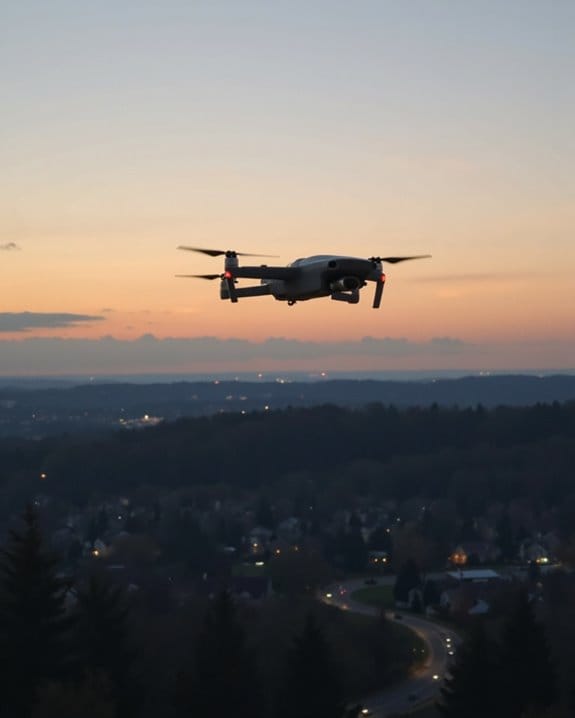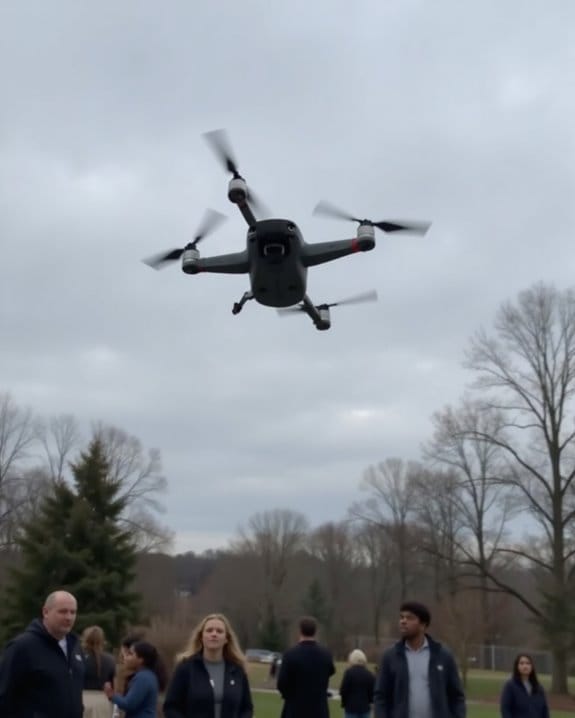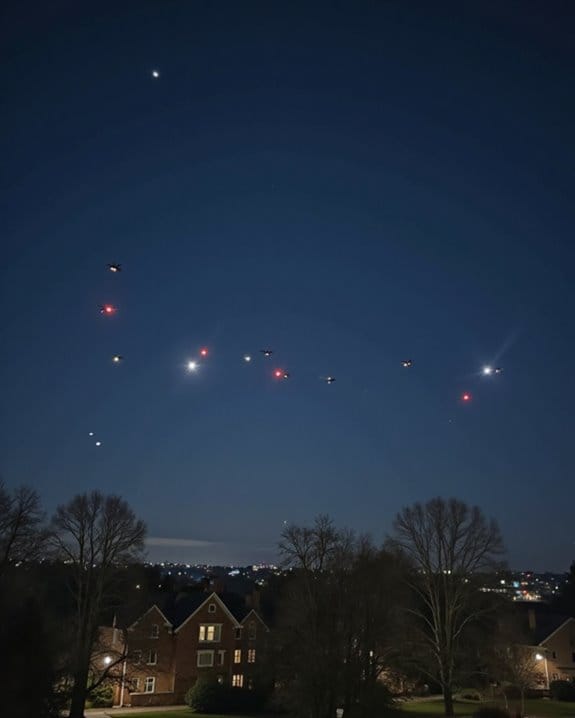You’ll find drones are tightly restricted in Vermont due to concerns over privacy, public safety, and orderly airspace management. State law prohibits flying below 100 feet over private property without permission, bans recording or surveillance, and enforces strict penalties for violations. There are clear fines for both first-time and repeated offenses, and even law enforcement faces tight surveillance limits. These rules build on federal FAA guidelines, ensuring Vermonters’ privacy and safety come first. Curious about the specifics? Stick around—there’s more to uncover.
Key Takeaways
- Vermont restricts drones to protect homeowner privacy, banning flights below 100 feet over private property without consent.
- State law prohibits using drones for surveillance or recording individuals and their property without explicit permission.
- Drones are banned from being weaponized in Vermont to prevent public safety risks.
- Flights near Vermont state airports are restricted to avoid potential midair collisions with manned aircraft.
- Law enforcement faces strict limits on drone use, with no exceptions for search warrants under proposed legislation.
Understanding Federal and State Drone Regulations
When it comes to flying drones, you’ll find that both federal and Vermont state laws play pivotal roles in shaping what’s allowed—and what’s strictly off-limits. The Federal Aviation Administration (FAA) is the main authority on drone regulations nationwide. If you’re flying a Vermont drone for fun, you must pass the TRUST test, register drones over 0.55 pounds, and use LAANC for controlled airspace. Commercial pilots must meet stricter requirements: be at least 16, pass the Part 107 test, and follow all relevant aviation laws. Vermont adds its own layer—no weaponization of drones, period. Plus, if you’re near a Vermont State Airport, you’ll need to submit a notification form. Basically, you’re maneuvering a sky full of rules—so fly smart! It’s also important to choose drones with built-in geofencing to ensure seamless compliance with airspace regulations in controlled zones.
Vermont’s Specific Laws on Drone Usage
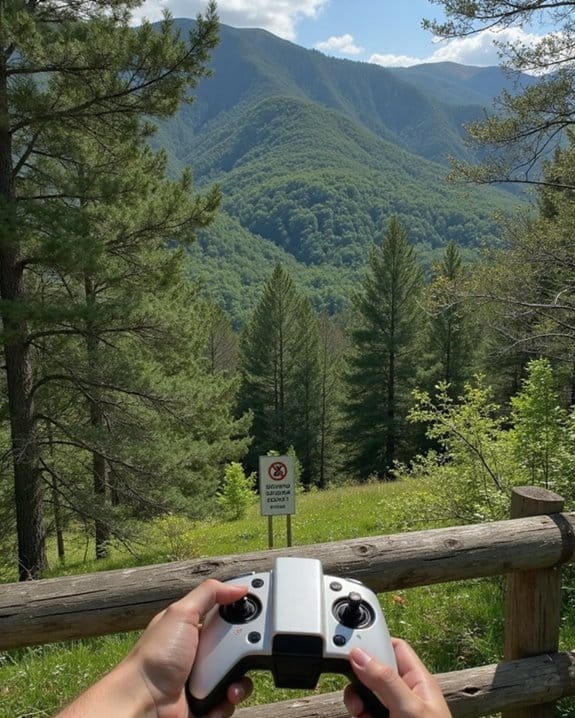
A quick look at Vermont’s drone laws reveals you can’t just send your quadcopter buzzing wherever you please. Vermont is serious about how you use drones, especially around private property and for recreational purposes. Here are the key rules you need to know:
Key Regulations:
- Don’t fly a drone less than 100 feet above private property for recreational purposes without the owner’s consent (Bill H.284).
- Weaponizing a drone? Absolutely not—state law strictly prohibits this.
- Planning to fly near a Vermont State Airport? You’ll need to notify them using a specific form.
Enforcement:
– First-time violators face a $50 fine; repeat offenses jump to $250.
In short, Vermont’s laws tightly regulate drone activities, so fly smart and stay within the lines—unless you enjoy paying fines. Additionally, understanding the legal regulations around drone usage can help you avoid penalties.
Privacy Concerns and Homeowner Protections
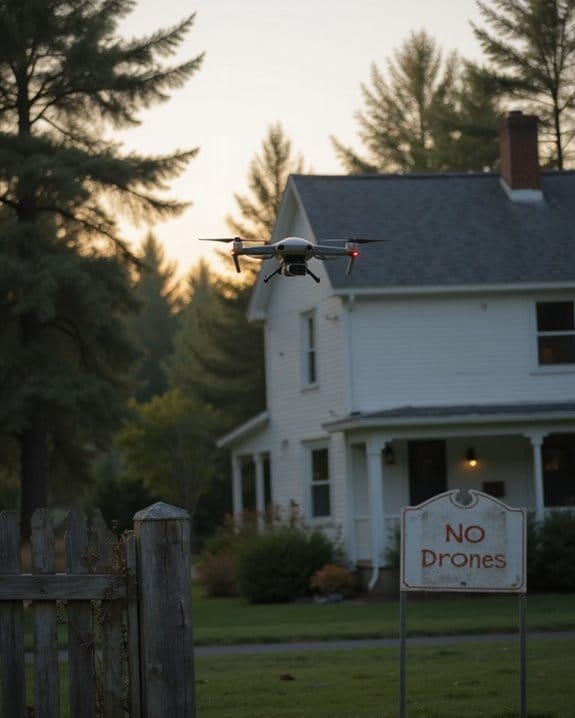
Curious how Vermont draws the line between aerial innovation and individual privacy? The state’s House Bill H.284 takes a strong stance. If you’re flying drones for fun, you can’t fly below 100 feet over someone’s property without their consent. Vermont’s law isn’t just about airspace—it’s about keeping a tight lid on data collection. Recording or surveilling private property using a drone is illegal, no matter how high you fly. Here’s a quick breakdown:
- Surveillance Defined: Observing, gathering data on identity, habits, or property details.
- Penalties: First offense gets a $50 fine; repeat it, and you’re out $250.
- Key Takeaway: Homeowner protections come first. If you want to innovate with drones, make sure you’re not invading someone’s backyard privacy.
It’s also important to note that legal restrictions often vary depending on the drone’s features and intended use, particularly when thermal imaging or surveillance technology is involved.
Safety Risks and Airspace Management
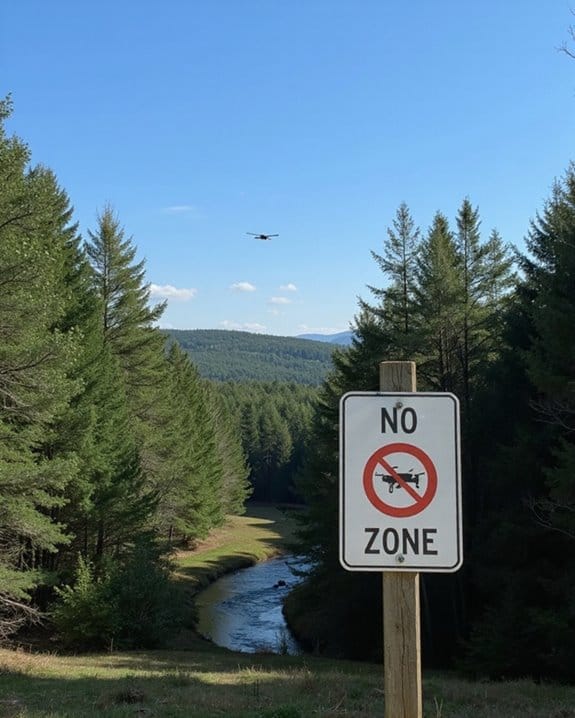
Safeguarding privacy isn’t Vermont’s only concern—keeping the skies safe matters just as much. If you’re flying a drone, you need to follow strict rules set by the Federal Aviation Administration (FAA). Why? Drones pose genuine safety risks, especially near busy spots like Burlington International Airport. The FAA requires you to get LAANC approval before flying in controlled airspace, helping to prevent midair collisions with manned aircraft. Vermont law also insists you notify authorities if you plan to fly near state airports. These measures aren’t just for show; incidents—like drone sightings that shut down Wright-Patterson Air Force Base—prove how much havoc drones can cause. For anyone flying recreationally or commercially, knowing the regulations isn’t optional—it’s critical for safe airspace management.
Law Enforcement and Surveillance Limitations
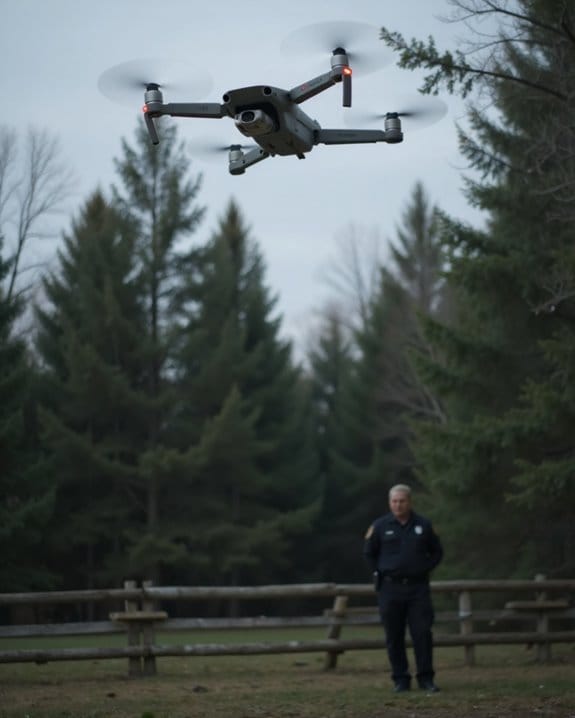
Ever wondered how Vermont keeps both privacy and law enforcement in check with drone use? Under the proposed H.284 bill, drones face strict limitations, especially for law enforcement. Here’s what you need to know:
Key Restrictions:
- Law enforcement can’t use drones to observe or gather information about someone’s identity, habits, or property features without explicit owner consent.
- Surveillance of private property by drone—even above 100 feet—is prohibited, limiting evidence collection in investigations.
- There’s no special exception for law enforcement; unlike Montana’s approach, Vermont doesn’t allow search-warrant drone use.
- Penalties start at $50, increasing to $250 for repeat offenses, deterring unauthorized surveillance.
Bottom line: Vermont’s rules prioritize homeowner privacy, equating unauthorized hovering to stalking, and forcing law enforcement to find alternatives to aerial monitoring.
The Impact on Recreational and Commercial Drone Pilots
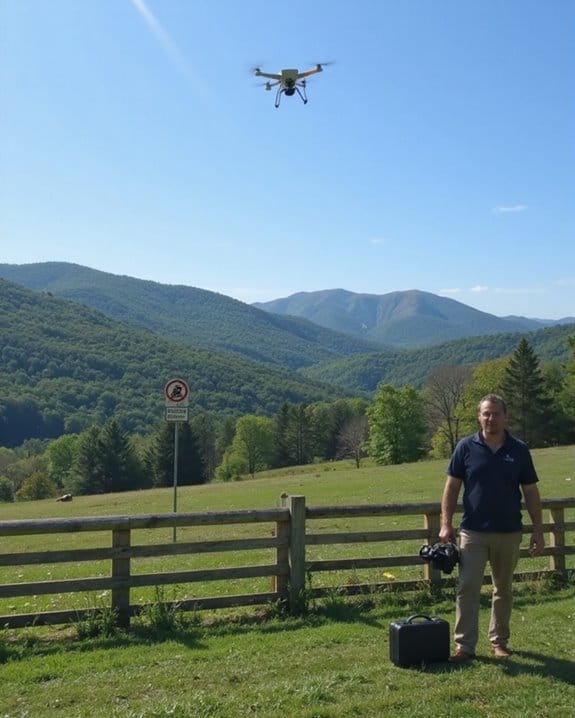
How do Vermont’s drone restrictions really play out for hobbyists and professionals? As a drone pilot, you’re maneuvering a maze of rules. H.284 prohibits flying below 100 feet over private land without permission, meaning spontaneous flights can land you fines—$50 at first, $250 after. Recreational flyers must think twice before launching, especially since hovering can be mistaken for surveillance. For commercial drone pilots, there’s double trouble: you have to follow both Vermont’s law and Federal Aviation Administration (FAA) requirements. LAANC approval is needed near airports, complicating operations for anyone offering drone services.
Key Specifications:
- Property owner consent required under 100 feet
- Surveillance strictly limited
- Fines for violations
- FAA compliance still mandatory
Recommendation: Always secure permissions, understand both state and federal rules, and document your flight plans.
Balancing Innovation With Community Interests
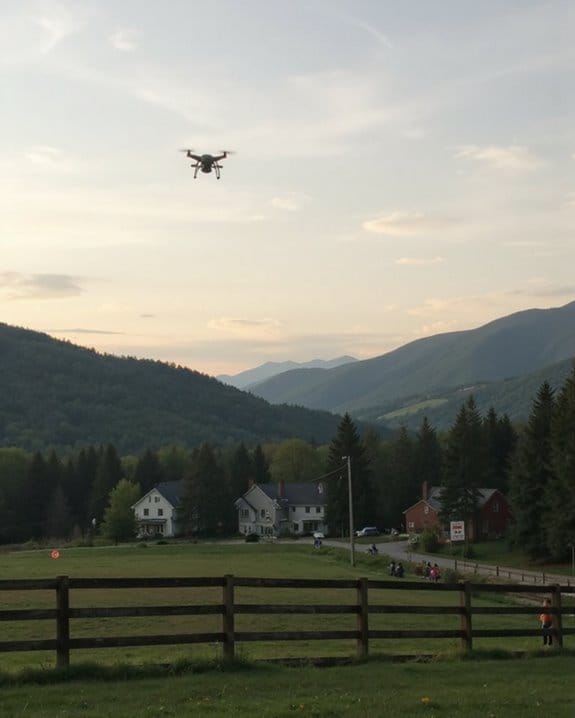
As Vermont’s drone pilots navigate a thicket of regulations, the state’s approach is more than just about limiting flight paths. If you want to fly drones or operate Unmanned Aircraft in Vermont, you’ll notice the law aims to respect both innovation and privacy. For example:
Key Points:
- You can’t drone around below 100 feet over private property without consent, protecting homeowners’ peace.
- Fines start at $50 and increase for repeat offenses, nudging hobbyists to think before they fly.
- Surveillance—gathering personal info with a drone—is strictly off-limits, but aerial photography for fun is fine if you’re courteous.
Analysis:
This framework lets you explore new drone tech while keeping neighbors comfortable. It’s a gentle balance—think “fly smart, fly kind”—that encourages innovation without turning you into a backyard spy.
Frequently Asked Questions
Are Drones Allowed in Vermont?
Yes, you can fly drones in Vermont if you follow FAA and state laws. You’ll need to register your drone, respect property boundaries, avoid surveillance, and never attach weapons. Always check airspace restrictions before flying.
What Are Some Negative Effects of Drones?
Oh, you thought drones were just high-tech toys? Think again! You’ll love strangers peeking into your backyard, scaring your pets, disrupting airports, and maybe even starring in an unauthorized surveillance video. Privacy and peace? Who needs those!
Why Are Drones Illegal?
You’ll find drones are illegal mainly to protect people’s privacy, prevent unwanted surveillance, and guarantee public safety. If you fly one without permission or misuse it, you’re risking fines or legal trouble for violating these strict rules.
Why Are Drones Not Allowed Over the Glacier Lagoon?
Did you know 83% of wildlife disturbances in protected areas are caused by drones? That’s why you can’t fly drones over the Glacier Lagoon—it’s to protect sensitive wildlife, comply with strict airspace rules, and avoid privacy violations.

